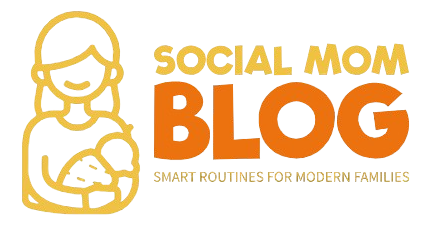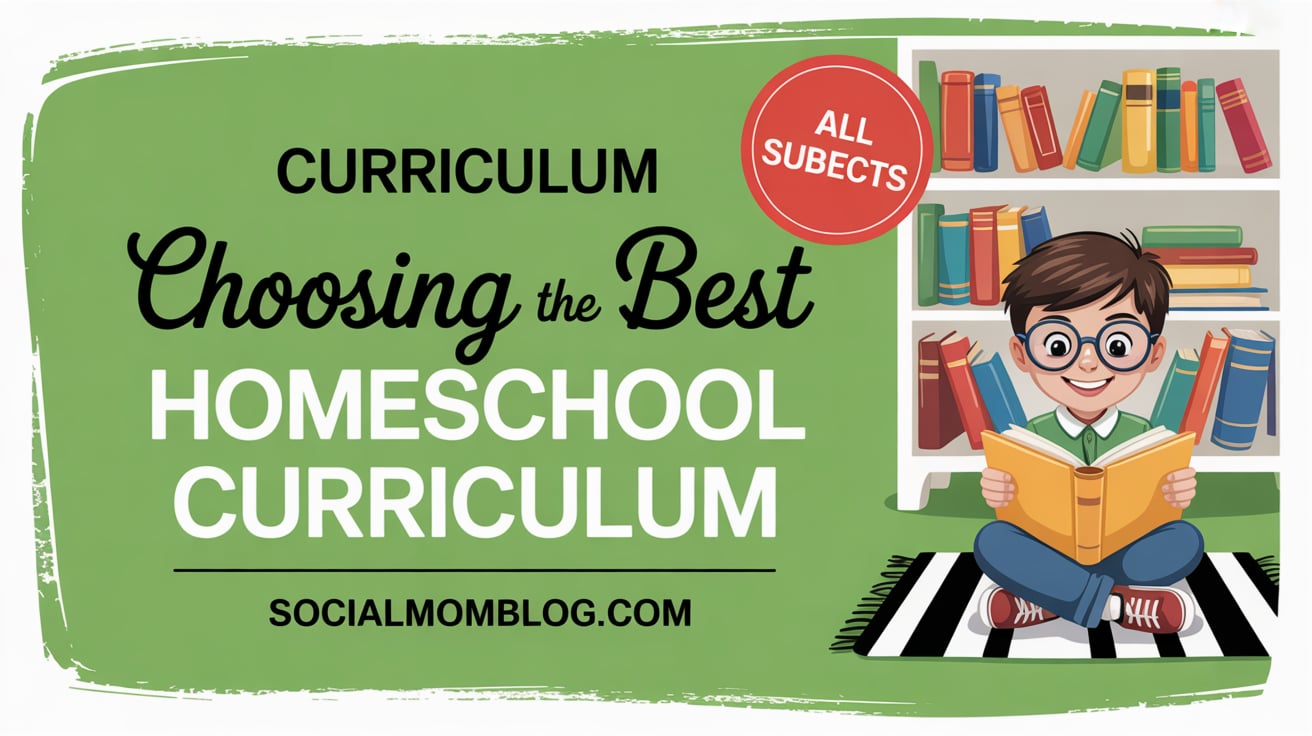Stepping into homeschooling can feel amazing, but then comes the big question: how do you even begin finding the best homeschool curriculum? It’s like staring at an entire library of options—from old-school textbooks to cool online lessons and tons of free stuff—and wondering where to start. Honestly, what you pick here genuinely shapes your child’s whole learning experience.
This guide is simply your clear map through all that. We’ll explore different curriculum types, check out the top online spots, dig up some fantastic free tools, and show you where to find real community support. My aim is to help you feel totally confident picking the best homeschool curriculum that truly fits your family and helps your kids absolutely love learning.
Overview
The best homeschool curriculum depends on your child’s learning style, your family’s goals, and your budget. Popular all-in-one programs include Time4Learning, Miacademy, Sonlight, and Oak Meadow. For individual subjects, parents often choose Saxon Math, Beast Academy, All About Spelling, Apologia Science, and Institute for Excellence in Writing. Free options like Easy Peasy and Khan Academy add flexibility. When choosing, consider your teaching philosophy, accreditation needs, cost, and whether online or physical materials work best for your child.
Understanding Homeschool Curriculum Types & Their Connection to Educational Philosophies
Choosing a curriculum isn’t a standalone decision; it’s intricately woven into your chosen homeschooling philosophy – the “why” behind your educational approach. A curriculum serves as the “how,” providing the materials and framework to implement your philosophy.
What are the major types of homeschool curriculum?
Homeschool curricula come in various forms, each offering distinct advantages:
All-in-One Programs
These comprehensive packages typically provide all subjects for a specific grade level, often including textbooks, workbooks, teacher guides, and even online components. Brands like Abeka, Calvert Homeschool, and K12 (Stride Learning Solutions) are well-known in this category. They offer structure and reduce planning time, making them popular for new homeschoolers or those preferring a traditional school-at-home approach.
Subject-Specific Curricula
Many families opt to mix and match. For instance, Singapore Math or Math-U-See are renowned for mathematics, while All About Reading or All About Spelling excel in language arts. This approach allows for customization based on a child’s strengths and weaknesses.
Unit Studies
These involve deep dives into a specific theme (e.g., ancient Egypt, marine biology) across multiple subjects like history, science, literature, and art. They are excellent for fostering interdisciplinary connections and engaging diverse learners.
Literature-Based Programs
Curricula like Sonlight emphasize reading “living books”—high-quality, engaging narratives—to teach various subjects, particularly history and language arts, fostering a love for reading.
Online vs. Offline / Print-Based
Curricula can be entirely digital (e.g., Time4Learning, Khan Academy), print-based (traditional textbooks), or a hybrid of both. This choice often depends on access, budget, and learning preferences.
How do different homeschooling philosophies influence curriculum choice?
Your homeschooling philosophy is your guiding star when selecting curriculum. For instance:
- Traditional/School-at-Home: Often aligns with all-in-one programs like Abeka or K12, mirroring conventional schooling with structured lessons and textbooks.
- Charlotte Mason: Emphasizes “living books,” narration, and nature study, often leading families to use resources like Ambleside Online or create their own plans based on rich literature.
- Classical Education: Follows the “Trivium” stages, prioritizing classics, logic, and rhetoric. Resources like The Well-Trained Mind guide curriculum selection in this style.
- Unschooling: Focuses on child-led learning based on interests, minimizing formal curriculum in favor of real-world experiences, mentors, and natural discovery.
- Eclectic Homeschooling: The most common approach, blending elements from various philosophies and curricula to create a highly personalized educational path. This might involve combining a structured math program with literature-based history and interest-led science.
For a deeper understanding of each homeschooling philosophy and how to align it with your overall approach, please refer to our ultimate guide, “How to Start Homeschooling: The 7-Steps Ultimate Guide” which elaborates on these foundational aspects.
How Do You Choose the Best Homeschool Curriculum for Your Family?
With the vast array of options, making an informed decision requires careful consideration of several critical factors unique to your family’s needs.
What are the essential criteria for selecting homeschool curriculum?
Choosing the right curriculum requires a thoughtful assessment of these crucial elements:
Before anything else, understand your state’s specific homeschooling laws. Some states mandate certain subjects (e.g., health, civics), while others require specific assessment methods (e.g., standardized testing, portfolio reviews) that might influence your curriculum choice. For detailed information, consult our guide: Guide About Homeschooling Laws by State.
- Visual Learners: Benefit from materials with charts, diagrams, videos, and clear visual aids.
- Auditory Learners: Thrive with lectures, discussions, audiobooks, and read-alouds.
- Kinesthetic/Tactile Learners: Require hands-on activities, experiments, manipulatives, and movement.
Tailoring curriculum to your child’s inherent learning style significantly boosts engagement and retention. Incorporating their specific interests (e.g., dinosaurs, space, coding) can transform lessons into exciting discoveries.
Consider how much direct instruction you desire to provide. Are you looking for a fully “open-and-go” program that requires minimal preparation, or do you prefer to actively teach, supplement, and customize? Some curricula are highly teacher-dependent, while others foster more independent student work.
Homeschooling costs can vary wildly. Free resources are abundant (discussed in Section 5), while comprehensive paid curricula can range from a few hundred to over a thousand dollars annually per child. Factor in potential “hidden costs” like supplies, field trips, and supplementary materials.
Evaluate the daily and weekly time commitment required for both instruction and preparation. Some programs demand significant parent-led teaching, while others are largely self-paced by the student.
This is a fundamental choice for many families. Numerous high-quality curricula exist for both faith-based (e.g., Abeka, BJU Press, Sonlight) and secular (e.g., Oak Meadow, Time4Learning) approaches. Aligning curriculum with your family’s values ensures consistency in learning.
Life happens! A curriculum that allows for customization, adaptation, or even pauses can be invaluable. Can you skip lessons, add outside resources, or adjust the pace without disrupting the entire program?
How can I “try before I buy” homeschool curriculum?
Given the investment, it’s wise to test-drive curricula whenever possible:
- Free Trials & Sample Lessons: Many online platforms and publishers offer free trials or downloadable sample lessons (e.g., a few weeks of content) that allow you to gauge fit.
- Library Resources: Your local library is a treasure trove! Many textbooks, living books, and educational materials used in homeschool curricula are available for free.
- Homeschooling Fairs & Conventions: These events often feature booths where you can physically browse materials, ask questions, and sometimes even participate in sample lessons.
- Connect with Local Homeschool Groups: Many co-ops and local groups have curriculum swaps, lending libraries, or members willing to share their experiences and even let you borrow materials.
Top Rated & Popular Homeschool Curriculum Options (Paid & Comprehensive)
Navigating the multitude of paid curriculum options can be daunting. Here’s an overview of some of the most highly regarded and popular choices, each catering to different styles and needs.
What are the top 10 best homeschool curriculum programs? (A Comparative Overview)
While “best” is subjective, these programs consistently receive high ratings for their quality and comprehensiveness:
Where can I find reputable homeschool curriculum reviews?
For unbiased, in-depth reviews, Cathy Duffy Reviews is widely considered the gold standard in the homeschooling community. Cathy Duffy has been reviewing curriculum since 1984, offering comprehensive insights through her website and books like “103 Top Picks for Homeschool Curriculum.”
Her detailed analyses often include learning style recommendations and philosophical alignments. Other valuable sources include established homeschooling blogs and forums, though always consider multiple perspectives.
What are the best online learning platforms for kids in homeschooling?
Online platforms cater to various needs, from full curricula to skill-specific practice:
How do online resources complement traditional homeschooling methods?
Online platforms offer unparalleled flexibility and access:
- Customization: They allow for a highly personalized learning path, enabling students to accelerate in strong subjects or take extra time where needed.
- Specialized Subjects: Provides access to subjects or advanced topics that parents may not feel confident teaching (e.g., higher-level math, foreign languages, coding).
- Automated Grading & Record-Keeping: Many platforms streamline administrative tasks, freeing up parents’ time.
- Engagement: Interactive lessons, games, and multimedia elements can boost student engagement and cater to diverse learning styles, especially visual and auditory learners.
Where can I find high-quality free homeschool resources by subject?
Leveraging free resources can significantly reduce costs while maintaining quality:
- Time4Learning: (As detailed above) Offers a full, interactive, standards-based curriculum.
- K12 (Stride Learning Solutions): (As detailed above) Provides a complete online school experience.
- Easy Peasy All-in-One Homeschool: (Free) A comprehensive, Christian, K-12 curriculum entirely online (more details in Section 5).
- Study.com: Offers online courses with quizzes, practice tests, and video lessons that can be used for credit or supplementing.
- IXL: Focuses on math and language arts, offering thousands of adaptive practice questions that adjust to the student’s level.
- ABCmouse.com: Popular for preschool through 2nd grade, providing engaging activities in reading, math, science, and art.
- Outschool: A marketplace for live online classes taught by independent teachers, covering everything from coding and art to unique history lessons and language immersion.
- MasterClass: For older students, offers pre-recorded lessons from world-renowned experts in various fields.
What are the best educational YouTube channels for kids and learning?
YouTube can be a powerful supplementary tool when curated thoughtfully. Here are some of the most highly recommended educational channels:
- Khan Academy: (As mentioned, also has a dedicated channel for its video lessons).
- TED-Ed: Animated lessons on various subjects (history, science, philosophy) often with accompanying questions.
- Crash Course / Crash Course Kids: Fast-paced, engaging videos on complex subjects for middle school to high school (and a dedicated channel for younger kids).
- SciShow Kids: Explores scientific topics with fun experiments and explanations for elementary learners.
- Homeschool Pop: Educational videos specifically designed for homeschoolers, covering history, geography, and science topics.
- Art for Kids Hub: Step-by-step drawing tutorials that engage children of all ages.
- National Geographic Kids: Captivating videos about animals, nature, and the world.
- Numberblocks / Alphablocks: Excellent for early math and literacy (numbers and phonics).
- Veritasium / AsapSCIENCE: For older kids, delves into fascinating science concepts.
Where Can You Find Support & Community for Your Homeschool Journey?
You don’t have to homeschool alone. Community support can significantly enhance your curriculum choices and overall journey.
What are homeschool co-ops and how can they support curriculum choices?
A homeschool co-op (cooperative) is a group of homeschooling families who collaborate to share teaching responsibilities, resources, and social activities.
- Benefits for Curriculum:
- Shared Expertise: Parents can teach subjects they are passionate about or proficient in, providing specialized instruction (e.g., a parent who is a chemist teaching advanced science labs).
- Access to Resources: Co-ops often pool funds for expensive materials, science equipment, or field trips.
- Group Learning: Ideal for subjects best learned in a group, like foreign languages, drama, public speaking, or team sports.
- Socialization: Provides structured opportunities for children to interact with peers and learn from other adults.
- Accountability: Provides a sense of structure and motivation for both parents and students.
- Finding a Co-op: Search online directories, local homeschooling groups on social media, or ask at local libraries or community centers. Some are highly academic, while others focus more on social events or electives.
How can online homeschool communities and forums provide curriculum support?
Online communities offer invaluable peer support, reviews, and troubleshooting:
- Curriculum-Specific Groups: Many popular curricula have dedicated Facebook groups or forums where users share tips, modifications, and support.
- General Homeschool Forums: Websites like The Well-Trained Mind forums or general homeschooling Facebook groups allow you to ask questions, read reviews, and get advice on a vast array of topics, including curriculum effectiveness and implementation challenges.
- Resource Sharing: Discover new free resources, curriculum sales, or even find opportunities to buy/sell used curriculum.
Practical Tips for Integrating & Adapting Your Homeschool Curriculum
Choosing a curriculum is a significant step, but successful implementation often involves ongoing flexibility and adjustment.
How to create a balanced homeschool schedule using your chosen curriculum?
While your curriculum provides the content, how you weave it into your daily life is crucial.
- Flexibility is Key: Avoid trying to replicate a traditional school day rigidly. Homeschooling allows for greater flexibility based on your family’s rhythms.
- Mix Core & Electives: Balance academic subjects with art, music, physical activity, and free play.
- Looping & Block Scheduling: Consider dedicating specific days to certain subjects (e.g., Science Tuesday, History Thursday) or “looping” through subjects that don’t need daily attention.
- Integrate Interests: Find ways to incorporate your child’s passions into lessons, making learning more engaging.
When and how to adapt or switch curriculum if it’s not working?
It’s common for a chosen curriculum not to be a perfect fit. Knowing when and how to pivot is essential:
- Signs of a Mismatch:
- Consistent tears or frustration from your child (or you!).
- Lack of engagement or boredom.
- Significant difficulty or ease beyond their grade level.
- Feeling overwhelmed or constantly behind.
- Strategies for Adaptation:
- Supplementation: Add external resources (videos, library books, games) to bolster weaker areas or provide more engagement.
- Pace Adjustment: Slow down or speed up lessons as needed.
- Modification: Skip sections, rephrase instructions, or use different assessment methods.
- Partial Switch: Keep strong subjects but replace struggling ones.
- Permission to Change: Understand that switching curriculum is not a failure; it’s an informed decision to optimize your child’s learning. Don’t be afraid to try something new, especially after a trial period.
Homeschooling FAQs (What Parents Ask Most!)
Conclusion
Choosing the best homeschool curriculum and resources is a deeply personal and evolving process. It’s about more than just picking a product; it’s about understanding your family’s unique needs, aligning with your educational philosophy, and finding tools that empower your child’s natural curiosity and love for learning.
By diligently researching options, leveraging the vast array of online and free resources, and tapping into supportive communities, you are well-equipped to create a dynamic, effective, and joyful learning environment at home.
Remember, the “best” curriculum isn’t universal; it’s the one that best fits your child, your family, and your homeschooling vision. Trust your instincts, embrace flexibility, and celebrate every step of your unique educational journey.
References
- Time4Learning. (n.d.). Online Homeschool Curriculum. Retrieved from https://www.time4learning.com/
- The Good and the Beautiful. (n.d.). Homeschool Curriculum. Retrieved from https://www.goodandbeautiful.com/
- BJU Press. (n.d.). Homeschool Curriculum. Retrieved from https://www.bjupresshomeschool.com/
- Easy Peasy All-in-One Homeschool. (n.d.). A complete, free online Christian curriculum. Retrieved from https://allinonehomeschool.com/
- Saxon Math. (n.d.). Homeschool. Retrieved from https://www.hmhco.com/homeschool/saxon-math [8] Apologia. (n.d.). Homeschool Science Curriculum. Retrieved from https://www.apologia.com/
- Institute for Excellence in Writing. (n.d.). IEW Curriculum. Retrieved from https://iew.com/
- Connections Academy. (n.d.). Online Public School. Retrieved from https://www.connectionsacademy.com/
- K12. (n.d.). Online Public School. Retrieved from https://www.k12.com/
- Study.com. (n.d.). Online Courses & Education. Retrieved from https://study.com/
- Khan Academy. (n.d.). Free Online Courses, Lessons & Practice. Retrieved from https://www.khanacademy.org/





[…] To navigate the wide array of options and choose the perfect fit for your child, consult our in-depth analysis, Top 10 Best Homeschool Curriculum & How to Choose. […]